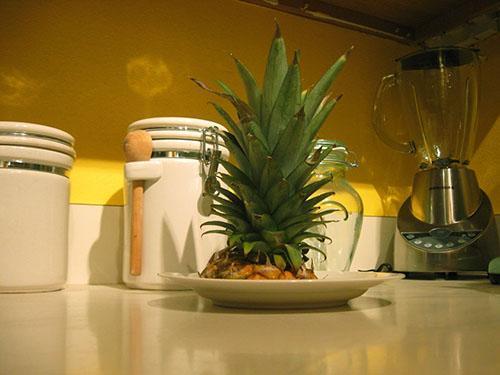Moderate consumption of ripe sweet pineapple will only benefit
 Pineapples, so beloved all over the world, are today grown in many countries of the tropical zone, and varietal plants are planted on plantations, compared to wild varieties, which have a greater weight, juiciness and sugar content. Pineapple, ripening under the tropical sun, accumulates up to 86% moisture in a few months and can weigh from 1 to 3 kg. And the sugar content in ripe pineapple reaches 9.85%.
Pineapples, so beloved all over the world, are today grown in many countries of the tropical zone, and varietal plants are planted on plantations, compared to wild varieties, which have a greater weight, juiciness and sugar content. Pineapple, ripening under the tropical sun, accumulates up to 86% moisture in a few months and can weigh from 1 to 3 kg. And the sugar content in ripe pineapple reaches 9.85%.
What are the beneficial properties of pineapple? When will eating the fruit be a good support for health and well-being, and in what situations is it better to refrain from juicy treats?
Vitamins, minerals and BJU in pineapple

Despite the fact that the calorie content of a 100-gram portion of the fruit does not exceed 48-52 kcal, the fruits contain many vitamins, acids and minerals.
The ratio of BZHU in pineapple per 100 grams of pulp is as follows:
- 13.12 grams of carbohydrates;
- 0.12 grams of fat;
- 0.54 grams of protein.
In addition, when eating a slice of ripe pineapple, about 1.4 grams of fiber gets into the body.
Among the vitamins in pineapple, useful for human health, ascorbic acid is in the lead. The concentration of the vitamin is so high that, having eaten 200 grams of fruit, a person provides the body with this vital compound in excess. There are 47.8 mg of vitamin C per 100 grams of pineapple.
The content of the remaining vitamins in fresh pulp and the ratio to the daily requirement can be represented as follows:
- B1 - 7%;
- B2 - 3%;
- B3 - 3%;
- B5 - 4%;
- B6 - 9%;
- B9 - 5%;
- Choline - 1%.
The mineral composition of pineapple includes calcium, magnesium and phosphorus, potassium, iron and zinc.
 Unfortunately, the concentration of these micro- and macroelements in pineapple is not so high, so there is no need to expect a miracle or serious health benefits from pineapple. When eating a 100-gram portion of fruit, the human body is replenished with these substances by 1–3% of the average daily intake. But the content of manganese in pineapple is extremely high. Only 200 grams of pulp can fully satisfy the need for this mineral.
Unfortunately, the concentration of these micro- and macroelements in pineapple is not so high, so there is no need to expect a miracle or serious health benefits from pineapple. When eating a 100-gram portion of fruit, the human body is replenished with these substances by 1–3% of the average daily intake. But the content of manganese in pineapple is extremely high. Only 200 grams of pulp can fully satisfy the need for this mineral.
The health benefits of pineapple
The obvious benefit of pineapple for the body is that the fruit is an excellent source of vitamin C. And B vitamins in the pulp are contained at such a level that, with a well-designed diet, pineapple will become a good support for the body during periods when it especially needs vitamins.
 But besides this, juicy slices of fresh pineapple are good for the body if a person has digestive problems associated with low acidity or insufficient synthesis of digestive enzymes. In this case, a small portion of fruit for dessert will help get rid of the feeling of heaviness after a meal, speed up the digestion of food and activate metabolism.
But besides this, juicy slices of fresh pineapple are good for the body if a person has digestive problems associated with low acidity or insufficient synthesis of digestive enzymes. In this case, a small portion of fruit for dessert will help get rid of the feeling of heaviness after a meal, speed up the digestion of food and activate metabolism.
Pineapples have a mild laxative and diuretic effect, which is important for people who want to lose a little weight, get rid of toxins and cope with edema.
The composition of the pineapple pulp predisposes to the fact that the inclusion of fresh fruit in the diet contributes to:
- thinning blood;
- reducing the risk of thrombosis and thrombophlebitis, varicose veins;
- reducing the likelihood of atherosclerosis and strokes.
Patients with hypertension, with regular consumption of fruit, note the health benefits of pineapple in terms of reducing high blood pressure.
 In autumn and winter, when there is a high risk of respiratory and viral diseases, pineapple can be included in the menu as a natural and very effective preventive measure against colds, flu, bronchitis and other similar ailments.
In autumn and winter, when there is a high risk of respiratory and viral diseases, pineapple can be included in the menu as a natural and very effective preventive measure against colds, flu, bronchitis and other similar ailments.
The significance and role of ascorbic acid in the body is well known, but the effect and benefits of B vitamins should be said separately.
For instance, vitamin B1 as part of pineapple is useful for the body because it is used in the treatment and prevention of cardiovascular diseases, various disorders of the nervous system. Also, vitamin B1 is indispensable for the health of the skin and the high-quality functioning of digestion. The compound is a natural antioxidant, therefore pineapples are good for the body of people of mature and older age.
 Vitamin B2 is used in diseases of the eyes and joints, intestinal dysfunctions and metabolic disorders.
Vitamin B2 is used in diseases of the eyes and joints, intestinal dysfunctions and metabolic disorders.
The high content of vitamin B6 in pineapple pulp can be used in situations where a person has problems with the absorption of fats and proteins, there are problems with the nervous system or skin diseases. Vitamins B6 and B9 involved in the synthesis of nucleic acids indirectly prevent aging of the human body. Vitamin B6 is a substance responsible for a person's need for insulin, which is important for everyone who suffers from or is prone to diabetes.
Folic acid in pineapple pulp is beneficial to health and essential for its functioning. It is responsible for the synthesis of red blood cells, which means that the composition and quality of blood, the course of metabolic processes and the general well-being of a person depend on its presence. The synthesis of serotonite, which is of great importance for the nervous system, depends on the presence of this vitamin.
 Thanks to vitamin B9, people feel appetite, this compound is also largely responsible for normal digestion. Low acidity, often observed in people of mature age, not only negatively affects the rate of food digestion, but also contributes to the development of pathogenic flora in the digestive tract. Lingering residues are inseminated by bacteria, fermentation and decay processes begin. Not only does the body not receive the required nutrients, it becomes clogged with toxins and dangerous toxins. With this feature of the body, the beneficial properties of pineapple are most in demand.
Thanks to vitamin B9, people feel appetite, this compound is also largely responsible for normal digestion. Low acidity, often observed in people of mature age, not only negatively affects the rate of food digestion, but also contributes to the development of pathogenic flora in the digestive tract. Lingering residues are inseminated by bacteria, fermentation and decay processes begin. Not only does the body not receive the required nutrients, it becomes clogged with toxins and dangerous toxins. With this feature of the body, the beneficial properties of pineapple are most in demand.
Pineapple caution and misconceptions
 Today, pineapple is often touted as an effective weight loss aid. At the same time, it is recommended not only to arrange fasting days with the help of fruits, but also to completely change the diet, including in it a large amount of juice and fresh pulp.
Today, pineapple is often touted as an effective weight loss aid. At the same time, it is recommended not only to arrange fasting days with the help of fruits, but also to completely change the diet, including in it a large amount of juice and fresh pulp.
Unfortunately, nutritionists are not inclined to support the opinion that pineapple is miraculous. For everyone who wants to lose weight, pineapple can only be interesting as a low-calorie fruit, rich in vitamin C and has a useful diuretic and laxative properties.
The benefits of pineapple for the body, for example, as in the case of the enzyme complex bromelain found in fruits, has not been proven or exaggerated. And in some situations, the pulp can even be harmful to humans.
In some sources, recipes for pineapple tincture for weight loss are given.The composition made from vodka and fresh fruit after a week of infusion should literally burn fat. The developers of the diet promise such an action with three fluid intake. However, the liquid cannot bring anything but harm.
 Alcohol entering the body causes:
Alcohol entering the body causes:
- albeit slight, but intoxication;
- addiction during long-term use;
- instant assimilation of the calories contained in alcohol.
In addition, even the substances contained in pineapples from fresh pulp will not have time to turn into an alcohol-containing liquid. That is, pineapple tincture on vodka turns out to be not a remedy, but an ordinary, moreover, strong alcoholic drink.
 If the person taking it has a food intolerance to alcohol or pineapple, he will face extremely unpleasant consequences for his health.
If the person taking it has a food intolerance to alcohol or pineapple, he will face extremely unpleasant consequences for his health.
Fresh ripe sweet pineapples are a source of vitamins, health and vitality. But canned fruits and candied fruits made from fruits almost completely lose all useful properties inherent in pineapples.
If it is not possible to enjoy fresh fruit, it is better to prefer dried or previously frozen pineapples.
 And in some cases, doctors tend to talk about the dangers of pineapples for humans. Firstly, you should not include pineapple, which can cause allergic reactions, in the menu of children under 3-6 years old. For the same reason, adult allergy sufferers will also have to give up eating fruits. Secondly, people with increased acidity of the stomach, suffering from gastritis or ulcers, as well as pregnant and lactating women need to be careful about eating fresh fruit.
And in some cases, doctors tend to talk about the dangers of pineapples for humans. Firstly, you should not include pineapple, which can cause allergic reactions, in the menu of children under 3-6 years old. For the same reason, adult allergy sufferers will also have to give up eating fruits. Secondly, people with increased acidity of the stomach, suffering from gastritis or ulcers, as well as pregnant and lactating women need to be careful about eating fresh fruit.